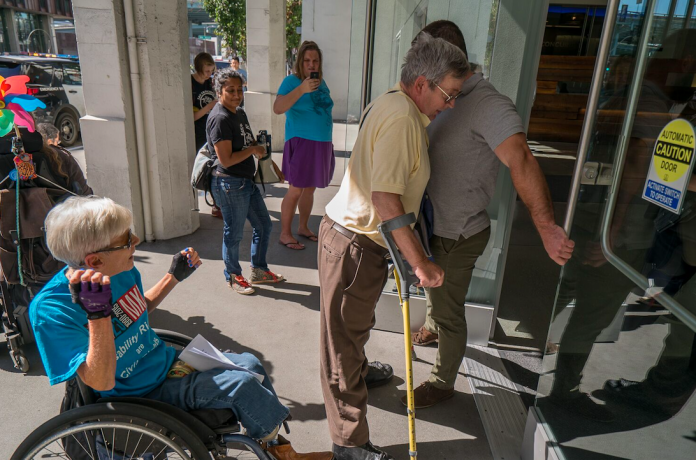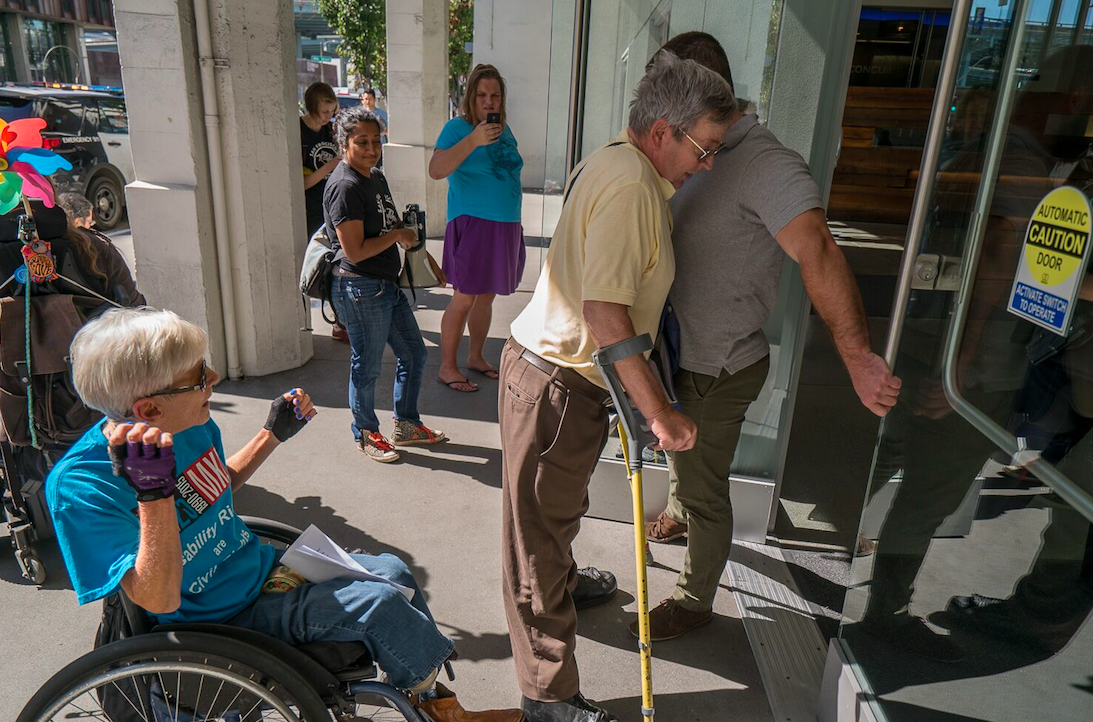
While Airbnb’s racial discrimination problems have received widespread public attention, the company’s unwillingness to follow the Americans with Disabilities Act and provide disabled travelers the opportunity to “live like a local” (as Airbnb’s marketing promises) have gone largely unnoticed.
But in May, an independent study from Rutgers University, “No Room at the Inn? Disability Access in the New Sharing Economy,” found that Airbnb and its hosts routinely discriminate against people with disabilities, turning aside lodging requests from people living with dwarfism, blindness, cerebral palsy, and spinal cord injuries at astonishingly high rates.

For years, Airbnb argued that it was “just a ‘platform,’” a disinterested marketplace where tourists could find accommodations in residential housing units. As such, Airbnb argued, it was categorically exempt from any regulations and laws that apply to traditional businesses.
When its “hosts” were found to discriminate against African Americans, Asian Americans and gays and lesbians, Airbnb loudly protested that it has “zero tolerance” for racial intolerance and would drop any prejudiced provider.
Lawsuits filed by discrimination victims, however, were illegitimate, because Federal law provides Internet companies blanket immunity from any challenge to their business practices, at least according to Airbnb lawyers. Airbnb itself could not be held responsible for its users’ bigotry.
That argument didn’t pass muster with a Federal judge, when Airbnb challenged San Francisco’s right to hold platforms liable for illegally renting housing units to tourists. Cities have the right and ability to regulate commerce, according to the Federal court.
Airbnb is one of the largest providers of tourist accommodations in the world. The company claims that it has more than three million listings in 165 countries and expects to book 100 million guest stays this year. Its current market valuation of more than $30 billion exceeds the value of the world’s largest hotel chains. But according to independent researchers at Rutgers, “people with disabilities were less likely to be preapproved and more likely to be rejected outright” by Airbnb’s hosts.
Airbnb has shown no interest in complying with the health, life safety and disability access standards that are routinely applied to traditional, legal tourist accommodations. It’s time for that to change.
There’s nothing innovative or disruptive about discrimination, and there’s no law protecting a platform’s right to embrace it. Airbnb is a dominant player in the travel industry. It’s past time for the corporation to assume responsibility for ensuring that all travelers, including those living with disabilities, have access to its accommodations.
Ogle and Planthold are long-time disability advocates.


The ADA is applicable to places of public accommodation. Common sense regarding rental to those with physical impairments can be determined on an individual basis dependent on the needs of the individual and the ability of the host to meet those needs.
ALL accommodations can accomodate dwarves and blind people. Of course it is illegal to refuse to rent an AirBnB room to a dwarf who walks.
You have written extreme hyperbole to make an irrelevant point. No one is suggesting AirBnB and all other vacation home rental companies be required to accomodate all disabilities. . . but dwarves, blind people and people who limp can and should be accomodated.
It is an ADA violation to refuse to rent one’s AirBnB listings to dwarves, the blind and other mobile but still disabled people. And it is really ugly to refuse to rent to people using canes, dwarves and the blind (who use canes to navigate the world).
I used to have an aunt who was very disabled by very serious rheumatoid arthritis: her hands, feet were all gnarled, she lived in constant pain. But she could walk and she did. During my first marriage, my ex husband refused to allow this aunt to visit me, with my mother, to meet our new infant. He said he couldn’t stand being around cripples. No public accommodation issue, just inhumane human issue. I capitulated to his outrageous demand because he was very abusive and I didn’t like getting smacked around. I was so appalled. The marriage did not outlast our child’s infancy.
If you seriously think that Airbnb is required regulate its users into being ADA compliant, then EVERY vacation home rental company would be required to follow suit. That would mean no home, in-law unit, shared room in a house, etc. traditionally found on sites like Airbnb, VRBO, Home Away, Craigslist etc. could be rented unless it was ADA compliant.
Saying “I won’t rent to you because you are black/Chinese/Jewish” is clear cut discrimination which is why Airbnb issued a statement against it. Saying “Im not able to rent to someone with cerebral palsy because my rental unit is not sufficiently ADA accessible and I don’t want to risk a lawsuit due to injury” is not discrimination.
And again, if you want to mandate that Airbnb follows these ADA rules, ALL vacation rental companies would have to follow suit. This would include local mom and pop property management firms dealing with a dozen homes as well as the big corporations with millions of listings. You can’t just target one company just because you have an agenda against them.
Bob, so far you show inadequate knowledge of the subject about which you wrote.
Title II, Sec 201 (a) of the Civil Rights Act specifically excludes those of us who provide lodgings (public accommodations) via Airbnb if we live in/on the property, and as long as the property contains fewer than five units.
Airbnb has two types of hosts – the owner-occupied, and the non-owner occupied. In other words, those who run it as a business, and those who share their homes One is clearly exempt by law, the other would seemingly need to comply with the ADA requirement.
Your article contains quite a lot of sensationalism, i.e., "..found that Airbnb and its hosts routinely discriminate against people with disabilities, turning aside lodging requests from people living with dwarfism, blindness, cerebral palsy, and spinal cord injuries at astonishingly high rates." That, as I first stated, is hogwash. Try being factual in your articles, it helps those who read them better understand reality, and not some view being spewed forth by someone with, apparently, an agenda.
"he ADA does not apply to housing with 3 or few units." This is the particular requirement in a particular locale and does not necessarily apply to code requirements in other cities.
And balderdash! See below!
The ADA is civil rights legislation providing accessiblity to places of public accommodation for those with physical disabilities and other impairments. It is a living document which has continued to evolve over the years of its inception to include expanded understanding of the word and condition of "diabilities".
Airbnb headquarters as a place of business needs to be accessible as a place of public accommodation for those with disabilities as mandated by the ADA. It could not be built or occupied if it did not meet code requirements, accessibility guidelines and a miriad of other regulations for commercial occupancy classifications
Individual participants in Airbnb hosting do NOT need provide accommodation to individuals because individual homes are NOT places of public accommodation. It is not reasonable that individual homeowners who participate in airbnb on a partime basis would need to make their homes accessible. This is excessive and not in the spirit of ADA legislation.
It would be wise to check with local building code authorities regarding compliancy on these matters, but I cannot forsee that individual homeowners would need to comply. It is great that some places may comply easily but as Kraus states below: the ADA does not apply to housing with 3 or few units.
Bob, your description lacks even a cursory knowledge of how Airbnb works. Local code authorities in cities where legislation is being enacted to protect guests, hosts and neighborhoods have adopted what code requirements are necessary for their particular locale. In our city we have certain requirements that every host must include, but does not include accessibility issues.
Airbnb cannot be involved in code compliance in cities as each locale is legislated on a state and local level.. Further, hosts in their descriptions of their accommodation have fully detailed information about their spaces, including accessibility, and other conditions which may impact the guests' experience.
This is not discrimination, read what discrimination is in your desk copy of the DOJ's latest version of the ADA. What you describe is not.
There could be notices on all Airbnb listings that either the place is or is not ADA compliant. There is also an opportunity to communicate the need for access during the initial messages that hosts conduct with their potential guests. This might be the best time to mention any special needs.
Folks, Commenters [ so far] show lack of adequate info., both about ADA and about Airbnb.
ADA requires that all "public accommodations", of which Airbnb is one, MUST make ALL their services and jobs available to ALL. Already, Airbnb is not compliant. Nowhere did we say ALL listings at Airbnb MUST be physically accessible. Rather, Arbnb could require ALL listers to use a simple accessibility checklist, based on what local government already uses. That lets ALL customers know whether they can stay at each listing, or not. This same checklist lets people know what safety warning devices and emergency exits are available. Airbnb misses out on getting more business by its intransigence, and also engenders dissatisfaction by potential customers.
Then, with regard to Airbnb's internal workings, think what it means to have a meeting, in late 2017, with someone responsible for "diversity" — and find that disabled access is not part of that company's thinking. Airbnb was founded well after the ADA became effective, yet has its political, social, and customer-services thinking stuck in 1989 — the year before the ADA was passed.
So also is the thinking of the commenters, so far.
It would be impossible to mandate the application of the Americans with Disability Act (ADA) in private homes. That's why the ADA does not apply to housing with 3 or fewer units.
They did confront Uber/Lyft but the car services were able to comply in the same way that taxis did. They deployed a certain amount of ADA compliant cars in each city.
As far as being blocked at the door…did they just show up and ask to see the CEO or did they attempt to get a meeting with someone responsible using normal channels?
If they just showed up hoping to get a photo op then they should move aside and let credible people take up the cause.
Thats makes a lot of sense. "Killing with kindness" for those who hate ABnB.
The accompanying graphic of being blocked at the door is chilling.
I guess the next step is to confront Uber/Lyft with THIER accessibility (or lack thereof). After all, MUNI has been such a success, achieving speeds that are slower than an electric mobility device!
I see the authors' agenda as a way to require any AirBNB host to have accessible space if they are going to provide short-term rentals.
Hogwash! Many Airbnb hosts cannot host disabled guests for the simple reason their homes are not equipped/accessible or safe of the disabled. If you are going to publish a story, maybe you need to get the real facts before you go off half-cocked.